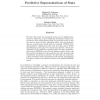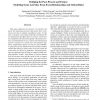48 search results - page 3 / 10 » Predicting future object states using learned affordances |
ECIS
2000
13 years 9 months ago
2000
- E-services will change the future of business as well as private relationships. The rearrangement of value chains, new competitive arenas and the growing necessity and interest i...
NIPS
2001
13 years 9 months ago
2001
We show that states of a dynamical system can be usefully represented by multi-step, action-conditional predictions of future observations. State representations that are grounded...
ICML
2010
IEEE
13 years 8 months ago
2010
IEEE
We develop a semi-supervised learning method that constrains the posterior distribution of latent variables under a generative model to satisfy a rich set of feature expectation c...
ICIP
2005
IEEE
14 years 9 months ago
2005
IEEE
We describe an enhanced method for the selection of optimal sensor actions in a probabilistic state estimation framework. We apply this to the selection of optimal focal lengths f...
CVPR
2012
IEEE
11 years 10 months ago
2012
IEEE
This paper addresses the discovery of activities and learns the underlying processes that govern their occurrences over time in complex surveillance scenes. To this end, we propos...


